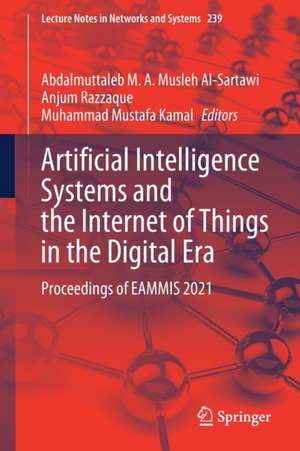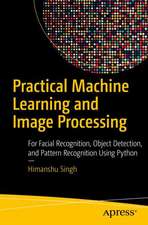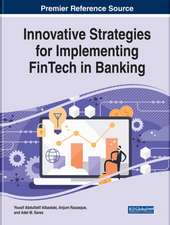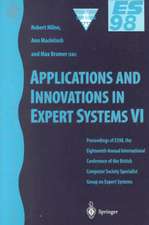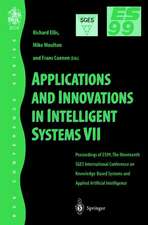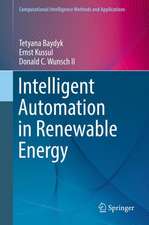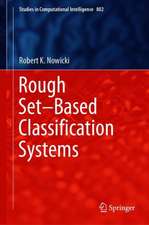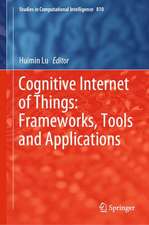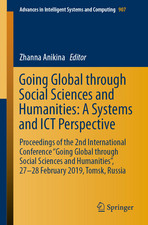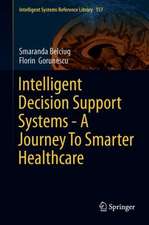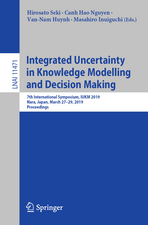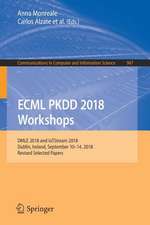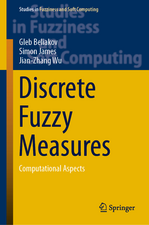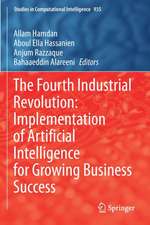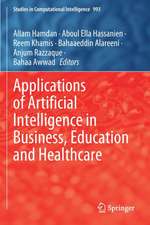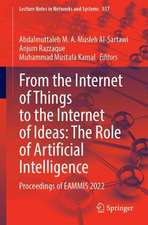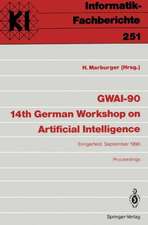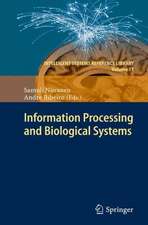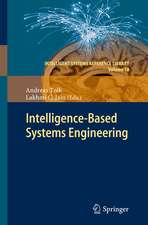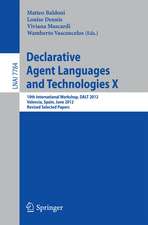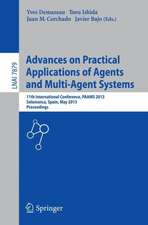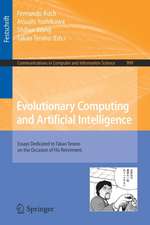Artificial Intelligence Systems and the Internet of Things in the Digital Era: Proceedings of EAMMIS 2021: Lecture Notes in Networks and Systems, cartea 239
Editat de Abdalmuttaleb M.A Musleh Al-Sartawi, Anjum Razzaque, Muhammad Mustafa Kamalen Limba Engleză Paperback – 29 mai 2021
Din seria Lecture Notes in Networks and Systems
- 20%
 Preț: 1019.63 lei
Preț: 1019.63 lei - 20%
 Preț: 1286.10 lei
Preț: 1286.10 lei -
 Preț: 282.79 lei
Preț: 282.79 lei - 20%
 Preț: 1463.18 lei
Preț: 1463.18 lei - 18%
 Preț: 1105.88 lei
Preț: 1105.88 lei - 20%
 Preț: 1462.99 lei
Preț: 1462.99 lei - 20%
 Preț: 1459.86 lei
Preț: 1459.86 lei - 20%
 Preț: 1463.49 lei
Preț: 1463.49 lei - 20%
 Preț: 999.35 lei
Preț: 999.35 lei - 20%
 Preț: 1348.81 lei
Preț: 1348.81 lei - 18%
 Preț: 966.27 lei
Preț: 966.27 lei - 20%
 Preț: 1690.34 lei
Preț: 1690.34 lei - 20%
 Preț: 1231.37 lei
Preț: 1231.37 lei - 20%
 Preț: 1317.46 lei
Preț: 1317.46 lei - 20%
 Preț: 1325.71 lei
Preț: 1325.71 lei - 20%
 Preț: 1833.90 lei
Preț: 1833.90 lei - 20%
 Preț: 1979.90 lei
Preț: 1979.90 lei - 20%
 Preț: 1948.56 lei
Preț: 1948.56 lei - 20%
 Preț: 755.70 lei
Preț: 755.70 lei - 20%
 Preț: 700.41 lei
Preț: 700.41 lei - 20%
 Preț: 2272.77 lei
Preț: 2272.77 lei - 5%
 Preț: 1898.20 lei
Preț: 1898.20 lei - 20%
 Preț: 1330.67 lei
Preț: 1330.67 lei - 20%
 Preț: 1468.26 lei
Preț: 1468.26 lei - 20%
 Preț: 988.32 lei
Preț: 988.32 lei - 20%
 Preț: 1749.74 lei
Preț: 1749.74 lei - 20%
 Preț: 1790.99 lei
Preț: 1790.99 lei - 18%
 Preț: 1107.73 lei
Preț: 1107.73 lei - 18%
 Preț: 1160.45 lei
Preț: 1160.45 lei - 18%
 Preț: 1549.36 lei
Preț: 1549.36 lei - 20%
 Preț: 1642.52 lei
Preț: 1642.52 lei - 18%
 Preț: 3101.88 lei
Preț: 3101.88 lei - 24%
 Preț: 1770.57 lei
Preț: 1770.57 lei - 18%
 Preț: 1608.06 lei
Preț: 1608.06 lei - 15%
 Preț: 577.07 lei
Preț: 577.07 lei - 20%
 Preț: 1958.48 lei
Preț: 1958.48 lei - 20%
 Preț: 1943.60 lei
Preț: 1943.60 lei - 18%
 Preț: 1404.93 lei
Preț: 1404.93 lei - 20%
 Preț: 1463.49 lei
Preț: 1463.49 lei - 18%
 Preț: 1570.03 lei
Preț: 1570.03 lei - 20%
 Preț: 1018.85 lei
Preț: 1018.85 lei - 18%
 Preț: 1229.10 lei
Preț: 1229.10 lei - 20%
 Preț: 1646.63 lei
Preț: 1646.63 lei - 20%
 Preț: 1299.31 lei
Preț: 1299.31 lei - 20%
 Preț: 1456.88 lei
Preț: 1456.88 lei - 18%
 Preț: 1854.17 lei
Preț: 1854.17 lei
Preț: 999.85 lei
Preț vechi: 1249.82 lei
-20% Nou
Puncte Express: 1500
Preț estimativ în valută:
191.34€ • 199.51$ • 159.02£
191.34€ • 199.51$ • 159.02£
Carte tipărită la comandă
Livrare economică 21 martie-04 aprilie
Preluare comenzi: 021 569.72.76
Specificații
ISBN-13: 9783030772451
ISBN-10: 3030772454
Ilustrații: XIX, 536 p. 119 illus., 84 illus. in color.
Dimensiuni: 155 x 235 mm
Greutate: 0.77 kg
Ediția:1st ed. 2021
Editura: Springer International Publishing
Colecția Springer
Seria Lecture Notes in Networks and Systems
Locul publicării:Cham, Switzerland
ISBN-10: 3030772454
Ilustrații: XIX, 536 p. 119 illus., 84 illus. in color.
Dimensiuni: 155 x 235 mm
Greutate: 0.77 kg
Ediția:1st ed. 2021
Editura: Springer International Publishing
Colecția Springer
Seria Lecture Notes in Networks and Systems
Locul publicării:Cham, Switzerland
Cuprins
Track 1: Innovation in the Digital Era.- Chapter 1 Model-based Validation of Business Processes: Case Study of Logistic Sector.- Chapter 2 COVID-19 Lung Image Classification based on Logistic Regression and Support Vector Machine.- Chapter 3 Performance Analysis of POX and RYU based on Dijkstra’s Algorithm for Software Defined Networking.- Chapter 4 Priority Based Power Delivery System for Electric Vehicle Charging.- Chapter 5 Clustering Algorithms as a tool for Odour Classifications in E-nose Developments.- Chapter 6 Bidirectional Octonion Long-Short Term Memory Recurrent Neural Networks for Speech Recognition.- Chapter 7 E-Learning Acceptance during the Covid-19 Outbreak: A cross-sectional study.- Chapter 8 Digital Social Contracts with AI Robots: Some Implications for Amazon.com.- Chapter 9 Adaptations during COVID-19 and Smart Disease Detection through ‘Germica’.- Chapter 10 Facebook advertising in the era of Digital Economy.- Chapter 11 Life-Saving APP: Snake Classification ‘Venomous and Non-Venomous’ using fast.ai based on Indian Species.- Chapter 12 Digital Media Usage among Arab Journalists during Covid-19 Outbreak.- Track 2: Industry 4.0 Management for Sustainable Technologies.- Chapter 13 Impact of E-Procurement on Supply Chain Performance.- Chapter 14 Predicting Pyramid Geometric Solar Water Still Plant Efficiency using RBF Based Multi-layer Perceptron.- Chapter 15 Comparative Analysis of Machine Learning Algorithms for Stock Market Prediction During Covid-19 Outbreak.- Chapter 16 Bitcoin Prediction using Ensemble Modelling.- Chapter 17 Structural Modeling of the Lean Supply Chain Enablers.- Chapter 18 Increasing productivity and quality with IoT technologies in industrial treatment systems.- Chapter 19 Intelligent Community Detection: Comparative Study (Covid19 Dataset).- Chapter 20 An Exploration into the Posture of Robo-Advisor Globally.- Chapter 21 A Review on Industry 4.0 Management for Sustainable Technologies.- Chapter 22 A Novel Hydro Renewable Power Platform: A Sustainable Innovation.- Track 3: Utilization of Blockchain, DLT, and Fintech for AI and IoT in the Digital eras.- Chapter 23 The Usage of Artificial Intelligence in New Media.- Chapter 24 Knowledge Management in Higher Education Institutions: Facts and Challenges.- Chapter 25 Artificial Intelligence and the Covid-19 Challenge.- Chapter 26 A Research for Computerized Maintenance Management System and Predictive Maintenance Investments in Turkish Industry.- Chapter 27 Artificial intelligence in personnel management: Opportunities and challenges to the Higher Education Sector (HES).- Chapter 28 Blockchain Technology for Reinforcing Sustainability Practices across Complex Multi-tier Supply Networks).- Chapter 29 Segmenting Potential Customers with Kohonen Network: A Bank-ing Sector Case Study.- Chapter 30 Applications of Artificial Intelligence in Covid-19 Pandemic.- Chapter 31 An Approach for Document Clustering using Semantic Similarity and Whale Optimization.- Chapter 32 OWLW: Ontology focused User Centric Architecture for Web Service Recommendation based on LSTM and Whale Optimization.- Chapter 33 KnowGen: A Knowledge Generation Approach for Tag Recommendation using Ontology and Honey Bee Algorithm.- Chapter 34 OntoReq: An Ontology Focused Collective Knowledge Approach for Requirement Traceability Modelling.- Chapter 35 KnowCrawler: AI Classification Cloud-driven Framework for Web Crawling using Collective Knowledge.- Chapter 36 Google's use of Artificial Intelligence in a two-sided advertising market causing trust loss, and data monopolization.- Chapter 37 Social Commerce: A Concept Explication.- Track 4: Role of Governance, Cybersecurity, and Privacy in AI and IoT.- Chapter 38 Financial Statements Fraud and Data Mining: A Review.- Chapter 39 The Impact of Balanced Scorecard on Firm Value: Evidence from Palestine.- Chapter 40 Corporate Governance and Sustainability of Financial Institutions: A Study of GCC Countries Banks.- Chapter 41 The Relationship between Human Resource Practices and Organizational Performance.- Chapter 42 Women Entrepreneurs (WE): Reshaping & Sustaining the Gulf Cooperation Council (GCC) Economy.- Chapter 43 The mediating role of employee engagement between quality of work-life and job performance in Jordanian commercial banks: conceptual paper.- Track 5: Fifth Industrial Revolution: The Internet of Ideas.- Chapter 44 A New Perspective on Decision Making and Coordination in Smart City Projects.- Chapter 45 Internet of Things and its impact on the future of education.- Chapter 46 Worldwide Artificial Intelligence Studies with a Comparative Perspective: How Ready is Turkey for This Revolution?.- Chapter 47 Technology readiness as an antecedent of technology acceptance model: A meta-analytic approach.- Chapter 48 E-Services and M-services using IoT: An assessment of the Kingdom of Bahrain.
Textul de pe ultima copertă
This book brings together intelligence systems and the Internet of Things, with special attention given to the opportunities, challenges, for education, business growth, and economic progression of nations which will help societies (economists, financial managers, engineers, ICT specialists, digital managers, data managers, policymakers, regulators, researchers, academics, and students) to better understand, use, and control AI and IoT to develop future strategies and to achieve sustainability goals. EAMMIS 2021 was organized by the Bridges Foundation in cooperation with the Istanbul Medeniyet University, Istanbul, Turkey, on March 19–20, 2021. EAMMIS 2021 theme was Artificial Intelligence Systems and the Internet of Things in the digital era. The papers presented at the conference provide a holistic view of AI education, MIS, cybersecurity, blockchain, Internet of Ideas (IoI), and knowledge management.
Caracteristici
Tackles global challenges related to AI and IoT in the digital era, with the aim of securing global sustainability Focuses on AI and IoT capabilities to collect and dynamically analyze users’ input for valuable real-time decision making within the Web 2.0 to be deployed to solve real-world problems Presents proceedings of the European, Asian, Middle Eastern, North African Conference on Management & Information Systems (EAMMIS 2021) held in Istanbul, Turkey, at March 19–20, 2021
